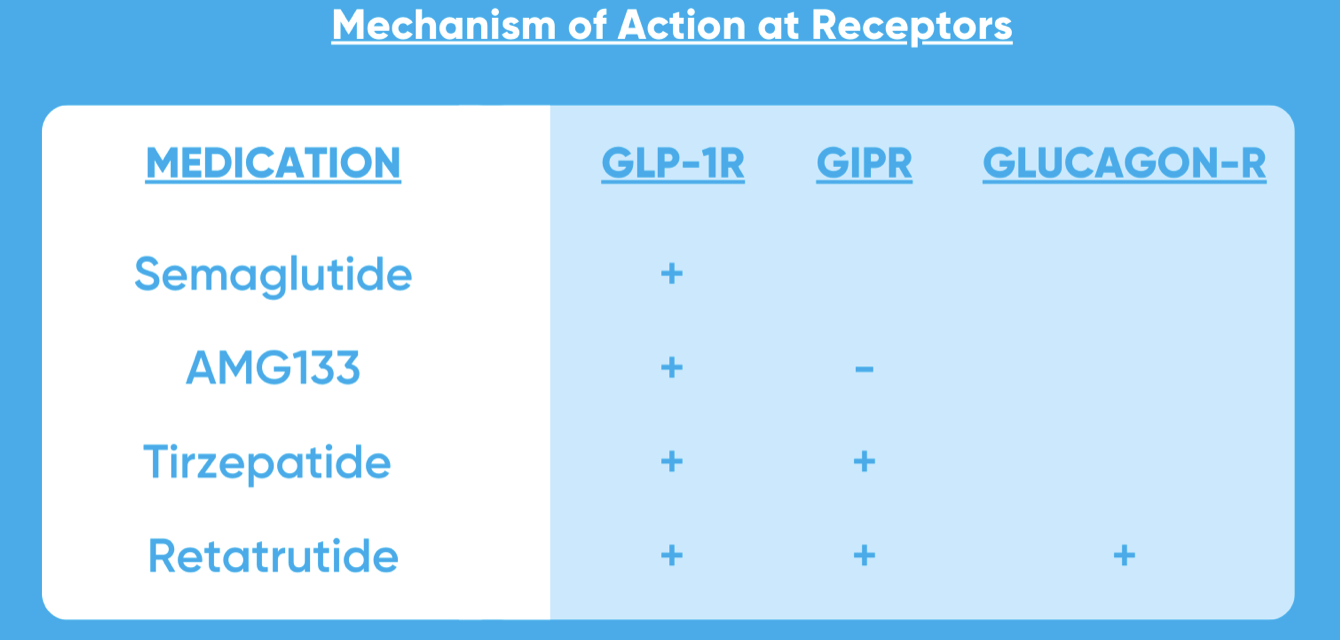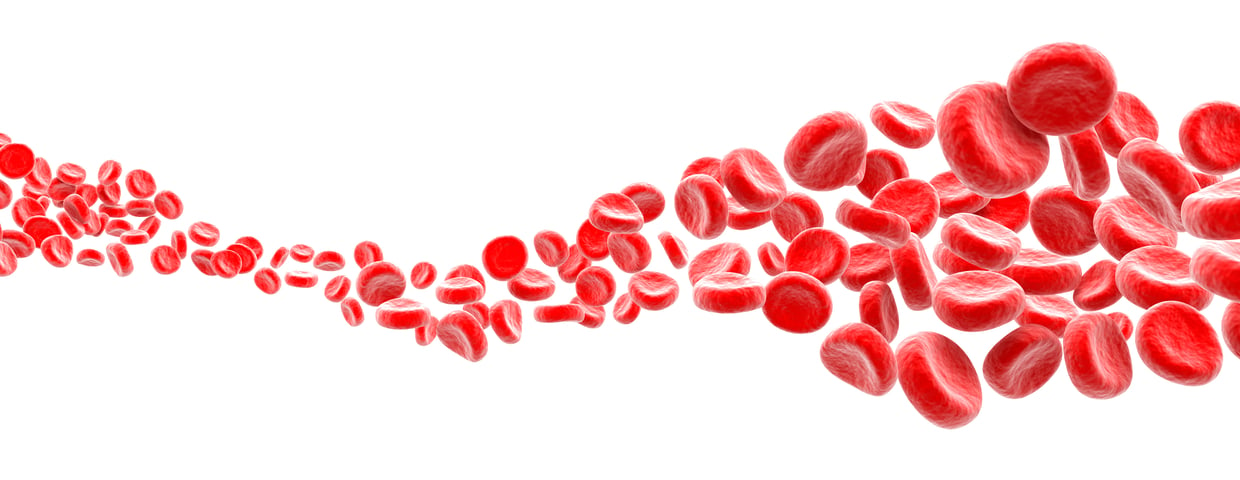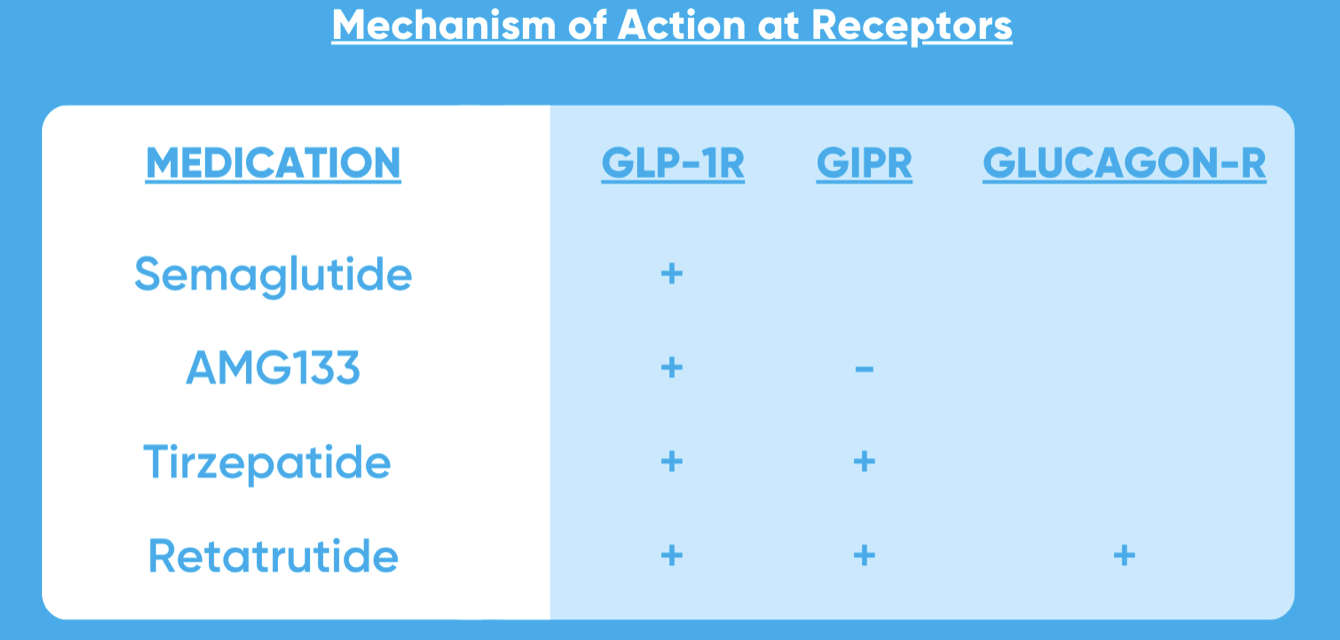Is Retatrutide better than Ozempic? Yes, it activates 2 additional receptors.
When is Retatrutide going to be available? FDA approved version we don't know, but it is available through our compounding pharmacy. Keep reading for more information.
Retatrutide will be a new medication for diabetes, weight loss and may also show promising cardiovascular benefits. Retatrutide shows promise to be the best weight loss medication among the popular fat loss medications Wegovy (Semaglutide) and Zepbound (Tirzepatide).
Retatrutide is a special type of medication that works on three different receptors in the body: GCGR, GIPR, and GLP-1R. It's made up of a fatty acid attached to a single peptide, which is a molecule made of amino acids. This medication is designed based on a modified version of a peptide called GIP. The modification allows retatrutide to stick to a protein called albumin in the blood. Because of this, the medication stays in the bloodstream for a long time, meaning people only need to take it once a week for it to work.
This medication has a broad range of effects because it can attach to different receptors. Here's how it works on each of them:
- Gastric Inhibitor Peptide Receptor (GIPR): This receptor, also known as the glucose dependent insulinotropic polypeptide receptor, is found in the brain and throughout the digestive system. It seems to be important for controlling hunger and telling the brain when the stomach is full.
- Glucagon-like Peptide Receptor-1 (GLP-1R): When this receptor is activated, it slows down how fast the stomach empties. Slower stomach emptying signals the brain to eat less, helping to manage weight. Drugs targeting this receptor were first made to treat type 2 diabetes, but they've been found to help with weight loss and reduce the risk of certain heart problems. Scientists are also looking into whether they could be used to treat depression, alcoholism, and other conditions.
- Glucagon Receptor (GCGR): This receptor is mostly found in the liver and kidneys. Changes in this receptor are linked to some types of type 2 diabetes. When retatrutide attaches to this receptor, it boosts the production of glucagon, a hormone that helps break down stored energy like fat and sugar. This increases the body's basic metabolism, even when sleeping, which leads to overall weight loss and specifically burns fat.
How Does Retatrutide Work?
Research in humans shows that Retatrutide activates all three incretin receptors: GIP, GLP-1, and GCG, to their full extent. Retatrutide was made to be very powerful at the GIP and GLP-1 sites. This makes retatrutide one of the strongest incretins around, affecting both how quickly the stomach empties and how our brains control hunger and feeling full. Most of retatrutide's effects come from reducing fat mass, likely because it helps people eat less food for longer periods compared to similar medications. Eating less, especially in the beginning of using retatrutide, starts burning fat. This helps with long-term weight loss by changing how our bodies use energy and fighting against the hormones that cause obesity. While retatrutide mainly works by making us eat less, it also increases how much energy we use, which is also important.

Retatrutide Effects on Each Receptor
GIP Effect: Stimulating the GIP reduces stomach acid and a hormone called gastrin, which helps digest food. Slowing down digestion makes us feel fuller.
GLP-1 Effects: Activating the GLP-1 receptor delays stomach emptying, supported by research in both animals and humans. Slower stomach emptying affects how our bodies handle blood sugar after eating. Slowing this down can help us eat less and lose weight. The delay caused by retatrutide is similar to other medications like Semaglutide or tirzepatide, but retatrutide works at a much smaller dose. However, like semaglutide, retatrutide's effect on stomach emptying lessens over time, which might need a break from the drug to restore its effectiveness.
GCG Effects: Recent research shows that glucagon, which acts through GCG receptor, helps control hunger and how our bodies use energy. Glucagon signals the brain from the gut through the vagal nerve, making us feel full. Glucagon levels in the liver's portal circulation regulate this signaling. Studies show that giving glucagon leads to a 20% weight loss and increases energy use. However, this effect isn't directly through GCG receptor but through another protein called FGF21, which is secreted by the liver. FGF21 helps burn fat without changing how much we eat.
BENEFITS OF RETATRUTIDE
- Helps induce weight loss
- Helps slow food leaving your stomach
- Helps prevent your liver from making too much sugar
- Helps the pancreas produce more insulin when your blood sugar levels are high
- Helps control blood glucose
- Can reduce hyperglycemia, especially after meals
- Can reduce fasting insulin and fasting glucose
- Can reduce hemoglobin A1c
- Can decrease appetite and caloric intake, while inhibiting weight gain
- Has been shown to lower triglyceride levels and oxidative stress from high LDL
- Helps decrease leptin and increase leptin sensitivity
- Can increase the conversion of white fat to brown fat
- May improve blood pressure
Retatrutide Dosage for Weight Loss
Studies suggest that retatrutide is one of the most effective weight loss medications based on incretins. In human phase 2 trials, retatrutide significantly reduced body weight. Participants given the highest dose lost around 20 pounds in 12 weeks, and others lost inches from their waist in 6 months. Weight loss with retatrutide varied with the dose over 48 weeks, with higher doses leading to more weight loss.
In a study reported in the New England Journal of Medicine, the amount of weight lost with retatrutide varied depending on the dose over the 48-week trial period. Those who received the lowest dose lost 8.7% of their total body weight, while those on the highest dose lost more than 24%. Similar findings were also reported in a JAMA article.
Retatrutide and Diabetes
Retatrutide has also shown promise in reducing glycated hemoglobin levels, which is important for managing diabetes and preventing its complications. Its effects on heart health are still being studied, but research suggests that it might improve heart rate and blood pressure.
In phase 2 trials, retatrutide has been found to significantly lower levels of glycated hemoglobin (HbA1c). Hemoglobin is a protein in the blood that carries oxygen, but when it combines with sugar, it forms glycated hemoglobin. High levels of this type of hemoglobin are usually due to consistently high blood sugar levels, which are characteristic of diabetes. Monitoring HbA1c levels is important for managing diabetes because keeping them low not only helps control blood sugar effectively but also reduces the risk of long-term complications like heart disease, nerve damage, kidney problems, and eye issues.
Retatrutide and Heart Health
Although the direct impact of retatrutide on heart health in humans hasn't been studied, research has been conducted.
Supporting this idea is the fact that several incretin agonists like semaglutide and liraglutide have been linked to improvements in heart health among people with diabetes. Because of this, these peptides are now being studied for potential direct use in treating heart disease. Retatrutide is expected to yield even better outcomes due to its broader impact on glucagon levels. However, the exact effects will need further investigation through detailed clinical and benchtop trials. These findings suggest that retatrutide and similar molecules could be beneficial for repairing the cardiovascular system and preventing heart disease in the first place.
Retatrutide Side Effects
In clinical trials, the most common side effects observed in patients treated with these medications were nausea, low blood sugar, diarrhea, constipation, vomiting, headache, decreased appetite, upset stomach, fatigue, dizziness, and abdominal pain.
Lose Weight with Retatrutide Today
Retatrutide is a compound that mimics incretins and activates GGG receptors. It interacts with glucagon receptors, gastric inhibitory peptide receptors, and glucagon-like peptide-1 receptors. This threefold activity has been associated with significant weight loss (up to 24% of body weight in 6 months) in clinical trials. This makes retatrutide the most effective among incretin peptides tested so far, leading to intense investigation as a weight loss treatment. There's also hope that retatrutide might have positive effects on heart health, making it potentially useful in managing heart disease complicated by diabetes, as well as heart disease in general.
Retatrutide and many other medications are available to you at TransformYou. Contact us today to receive a consultation on which weight loss program, hormone treatment or anti-aging program is best for you!
Research
Jastreboff et al., “Triple- Hormone-Receptor Agonist Retatrutide for Obesity - A Phase 2 Trial,” N. Engl. J. Med., vol. 389, no. 6, pp. 514–526, Aug. 2023, doi: 10.1056/NEJMoa2301972.
Harris, “Triple-Hormone Combination Retatrutide Induces 24% Body Weight Loss,” JAMA, vol. 330, no. 4, p. 306, Jul. 2023, doi: 10.1001/jama.2023.12055.
Urva et al., “The novel GIP, GLP- 1 and glucagon receptor agonist retatrutide delays gastric emptying,” Diabetes Obes. Metab., vol. 25, no. 9, pp. 2784–2788, Sep. 2023, doi: 10.1111/dom.15167.
Winkler, J. T. Kis, K. A. Kiss, and L. Schandl, “A GLP1-receptoragonistáktól a glükagonreceptoragonizmussal kiegészített hármashormonreceptor-aktiválásig.:hármashormonreceptor-aktiválásig.: Új távlatok a 2-es típusú diabetes és az elhízás kezelésében,” Orv. Hetil., vol. 164, no. 42, pp. 1656–1664, Oct. 2023, doi: 10.1556/650.2023.32894.
Coskun et al., “LY3437943, a novel triple glucagon, GIP, and GLP- 1 receptor agonist for glycemic control and weight loss: From discovery to clinical proof of concept,” Cell Metab., vol. 34, no. 9, pp. 1234-1247.e9, Sep. 2022, doi: 10.1016/j.cmet.2022.07.013.
Coskun et al., “LY3298176, a novel dual GIP and GLP-1 receptor agonist for the treatment of type 2 diabetes mellitus: From discovery to clinical proof of concept,” Mol. Metab., vol. 18, pp. 3–14, Oct. 2018, doi: 10.1016/j.molmet.2018.09.009
Frayling et al., “A Common Allele in FGF21 Associated with Sugar Intake Is Associated with Body Shape, Lower Total Body-Fat Percentage, and Higher Blood Pressure,” Cell Rep., vol. 23, no. 2, pp. 327–336, Apr. 2018, doi: 10.1016/j.celrep.2018.03.070.
Frias et al., “Efficacy and safety of LY3298176, a novel dual GIP and GLP-1 receptor agonist, in patients with type 2 diabetes: a randomised, placebo-controlled and active comparator-controlled phase 2 trial,” Lancet Lond. Engl., vol. 392, no. 10160, pp. 2180–2193, Nov. 2018, doi: 10.1016/S0140-6736(18)32260
Ceriello, S. Genovese, E. Mannucci, and E. Gronda, “Glucagon and heart in type 2 diabetes: new perspectives,” Cardiovasc. Diabetol., vol. 15, no. 1, p. 123, Aug. 2016, doi 10.1186/s12933-016-0440-3.
Read next in Medical Weight Loss

Senolytics: Dasatinib & Quercetin
By Dr. Robb Bird

Orforglipron: The Oral GLP-1
By Dr. Robb Bird

SLU-PP-332: The Next-Generation Mitochondrial Booster for Fat Loss and Longevity
By Dr. Robb Bird
Medically reviewed by Dr. Robb Bird, NMD FAARM
Medical Director, Transformyou
